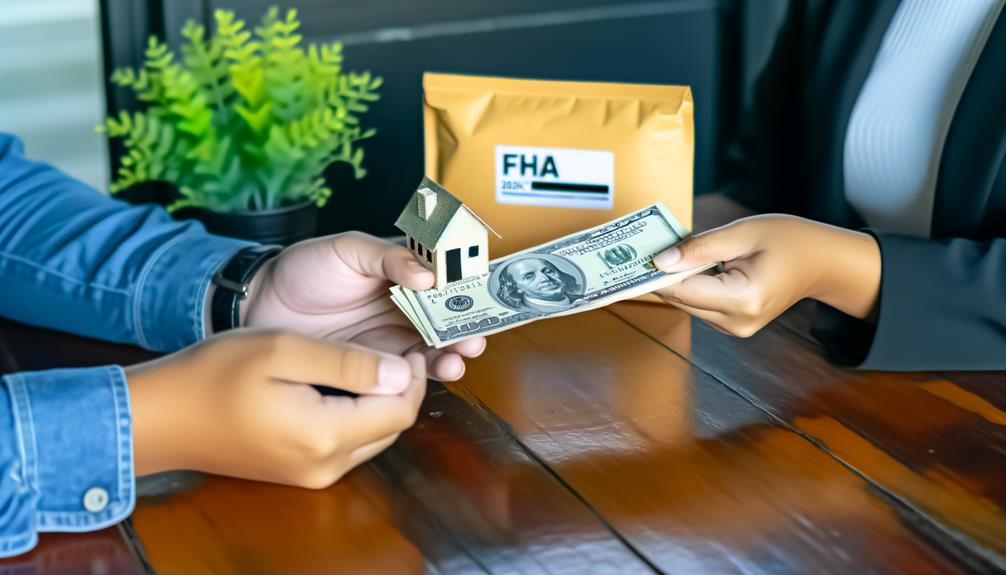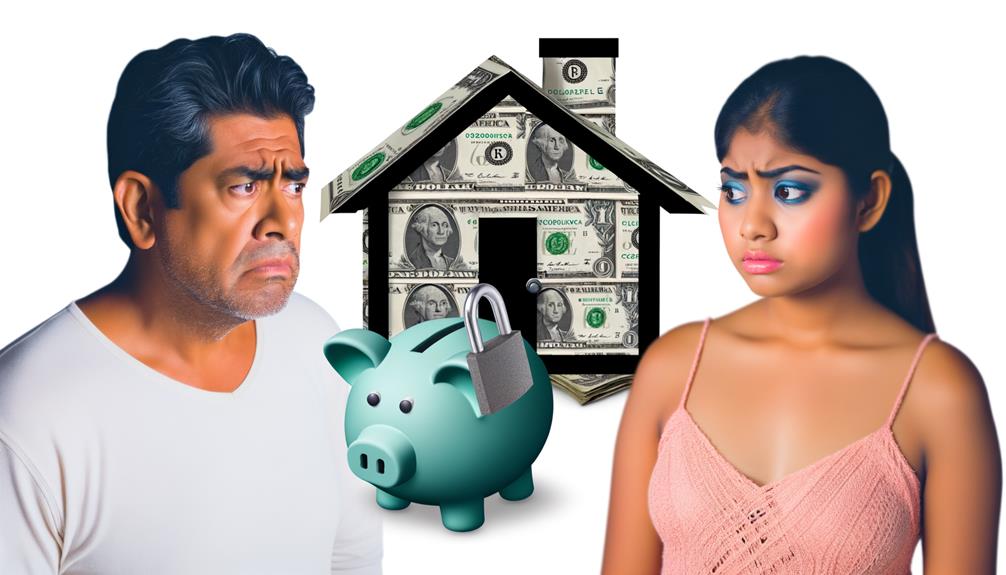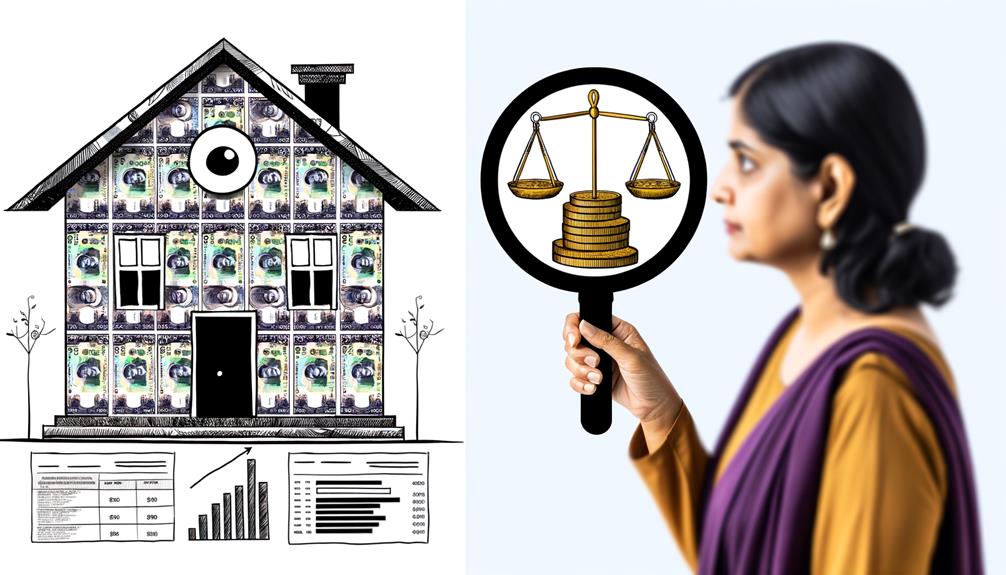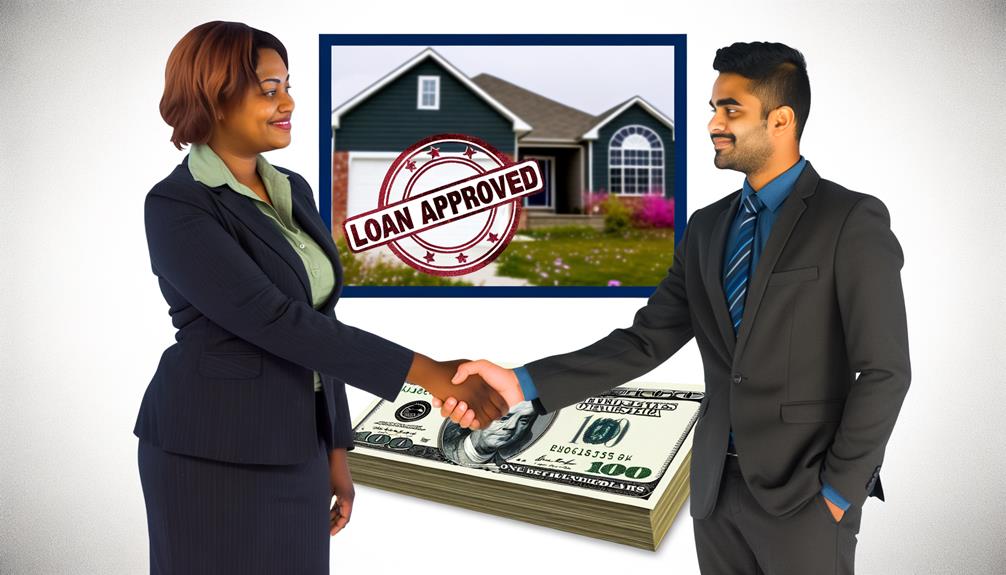Navigating the real estate market can be a complex endeavor, particularly when considering unique situations such as acquiring a cash-only house. Such transactions typically imply that the house in question may not qualify for a traditional mortgage for various reasons, including its condition or legal status. However, this does not imply that potential buyers are left without options.
Various financial avenues, each with their own merits and challenges, can be explored to secure the required funds. This conversation aims to provide insights into these alternatives, thereby assisting you in making an informed decision towards becoming the owner of a cash-only house.
Intrigued? Let's venture further.
Key Takeaways
- Cash-only home sales involve purchasing a property without the need for a mortgage.
- Financing options for cash-only homes include paying in cash, hard money loans, FHA 203(k) rehab loans, and cash-offer companies.
- Hard money loans are short-term, high-interest loans based on the property's post-renovation value.
- The FHA 203(k) rehab loan is a government-supported loan that allows buyers to finance the purchase and renovation of cash-only properties.
Understanding Cash-Only Home Sales
Delving into the realm of cash-only home sales, it is imperative to comprehend the various methods of financing such a transaction, including paying outright in cash, opting for a hard money loan, or leveraging an FHA 203(k) rehab loan for extensive renovations.
When buyers decide to buy a Cash-Only home, they typically pay the agreed-upon amount via certified check or wire transfer, sidestepping the need for mortgage lenders. This not only expedites the sales process but also benefits both parties by eliminating the uncertainty of loan approval.
Hard money loans, another financing option for cash-only homes, are short-term, high-interest loans offered by private investors. These loans focus on the property's estimated post-renovation value, making them a viable option for cash-only transactions when traditional financing is not available.
Alternatively, the FHA 203(k) rehab loan can be used for purchasing and renovating a cash-only property. This home loan option allows buyers to include renovation costs in their mortgage, providing a unique solution for properties in need of extensive repairs.
Lastly, cash-offer companies provide upfront underwriting, enabling buyers to make a cash-backed offer without possessing the cash upfront. This makes their offers more competitive in a seller's market, providing a streamlined process with reduced financing risk for sellers.
Hard Money Loans Explained
Hard money loans provide an alternative route for financing cash-only properties. Their focus is primarily on the property's post-repair value instead of the borrower's financial standing.
These loans, though beneficial in certain situations, carry substantial interest rates and require significant down payments. This can be a potential deterrent for some buyers.
It's important, thus, to comprehend fully the pros and cons of hard money loans before embarking on this financing path.
Understanding Hard Money Loans
In the realm of real estate financing, hard money loans emerge as a high-interest, short-term option primarily offered by private investors, with the unique characteristic of focusing on the property's potential value rather than the borrower's creditworthiness. These loans can be an attractive option to buy a cash-only home. However, understanding their nature is vital:
- Hard money lenders base loans on the property's after-repair value (ARV), not the borrower's credit score.
- A significant down payment is often required, typically around 20% of the property's value.
- The underwriting process is usually quicker than traditional loans, facilitating faster closing.
- These are short-term loans, often with terms of 12 months or less.
Knowing these aspects can guide potential buyers in their journey to acquire a cash-only house.
Pros and Cons
Weighing the benefits against the drawbacks of hard money loans offers invaluable insight into this financing method, particularly for those considering purchasing a cash-only property.
On the pros side, these loans can provide rapid access to cash, bypassing the traditional mortgage application process. They focus on the property's value rather than the borrower's credit history, which can be advantageous for those who may not be easily approved for a mortgage.
However, the cons include high-interest rates and fees, heightening the personal finance risk. A sizable down payment is typically required and the risk of foreclosure is more substantial due to shorter repayment terms.
It's essential to carefully consider these pros and cons before opting for this loan type.
The FHA 203(k) Rehab Loan

The FHA 203(k) Rehab Loan is a particularly relevant instrument for individuals seeking to finance a cash-only house that requires significant upgrades or repairs. This loan, supported by the federal government, comes in two variations – the Standard 203(k) for major renovations and the Limited 203(k) for minor, cosmetic changes.
To successfully navigate this financing route, it is critical to understand the processing and approval steps, which are known to be more detailed and time-consuming than traditional loan procedures.
Understanding the 203(k) Loan
Navigating the intricacies of the FHA 203(k) Rehab Loan can provide a feasible path for borrowers seeking to finance both the acquisition and renovation of a cash-only property. This mortgage loan deviates from a traditional mortgage, offering a unique strategy to make a cash offer when you buy a house.
The FHA 203(k) loan is designed to finance the purchase and renovation of a home, offering more flexibility than traditional lenders. Up to 96.5% of the 'as-is' appraised value including renovation costs can be financed.
Two types of 203(k) loans exist: standard for extensive renovations and limited for minor repairs. A detailed proposal of work, including costs and timeline, must be approved by the FHA.
Thus, this loan can be a pivotal tool in your home buying process, stretching your money further.
Processing and Approval Steps
To secure a FHA 203(k) Rehab Loan, the borrower must first submit an application to a lender approved by the FHA, initiating a detailed process that includes verification of credit, income, and employment, property appraisal, and eventual loan disbursement.
| Steps | Description |
|---|---|
| Application | The borrower submits a comprehensive application to an FHA-approved lender. |
| Verification | Lenders offer a thorough verification of credit score, income, and employment. |
| Appraisal | The property undergoes an appraisal to establish its value pre and post-repair. |
| Disbursement | Upon approval, funds are disbursed to buy the house and cover renovation costs. |
This application process, often facilitated by a mortgage broker, can lead to competitive rates. It's important to have a strong credit score and verifiable income to approve financing and secure the property.
Pros of Acquiring Loans for Cash-Only Homes
Acquiring loans for cash-only homes presents a unique opportunity for prospective investors, offering the advantage of entering the property market without the requirement of having full capital upfront. This allows individuals to buy a house even if they don't have the cash readily available. It also provides potential investors with the flexibility to make strategic decisions about their investments.
The benefits of using a loan to purchase a cash-only house include:
- Diversification: Using loans to buy multiple properties can help diversify your investment portfolio, reducing overall risk.
- Market Entry: Loans offer an entry point into the property market, particularly for those with limited cash.
- Wealth Building: Real estate is a tangible asset that can appreciate over time, providing a pathway to wealth creation.
- Negotiation Power: Getting approved for a loan provides negotiation leverage with real estate agents, as it shows you are a serious buyer.
Cons of Acquiring Loans for Cash-Only Homes

While there are undeniable advantages to securing loans for cash-only homes, it is essential to consider the potential drawbacks associated with this financial decision. Firstly, loans require higher interest rates and fees, making the purchase price considerably more expensive than cash offers. This could mean paying far beyond the current market value over the lifespan of the loan.
Securing financing from a financial institution for a large loan amount can be a challenging and time-consuming process. This is because cash-only homes often attract a higher risk, making banks and lenders hesitant. The risk is tied to the potential difficulty in reselling the house if the buyer defaults on the loan.
One significant risk potential buyers face is the likelihood of losing the property to foreclosure if they cannot keep up with loan repayments. The decision to pay cash or take a loan should be made after careful consideration of the current market, the market value of the house, and the buyer's financial stability.
Therefore, while loans offer an alternative to cash offers, understanding these cons is crucial to making an informed decision.
Making a Cash Offer Without Cash
Navigating the terrain of buying a cash-only house without liquid assets at hand can be a complex journey, but several innovative financing options are available that can make this goal achievable. These options include hard money loans and FHA 203(k) rehab loans, which offer flexible terms and are designed for specific situations, such as making an offer on a home.
- Hard money loans are provided by private investors with years of experience in the housing market. They are suitable for a cash-only transaction and focus on the property's future value post-repairs.
- FHA 203(k) rehab loans are government-backed and allow for major remodeling and repairs, providing a lifeline for those seeking to buy a home that requires extensive renovation.
- Upfront underwriting can speed up the loan approval process, helping you to secure the funding you need.
- Cash-offer companies and decision-now loan approvals can facilitate the process of buying a cash-only house without having the cash upfront.
To make sure you're getting the best deal when selling a home or making an offer, seek expert advice to navigate these financing options.
Upfront Underwriting Process

The upfront underwriting process, a comprehensive pre-approval strategy, transforms nontraditional homebuyers into competitive players in the housing market by completing the entire mortgage application and approval process prior to making an offer on a property. This is a proactive approach that allows potential buyers to demonstrate their financial credibility to sellers, making them more attractive prospects.
One of the key benefits of the upfront underwriting process is that it offers a detailed picture of the current value, rates and fees, and earnest money requirements for homes on the market. As a result, buyers are better prepared to negotiate and make compelling offers.
However, not all lenders provide this service, and according to a survey, only about 77 out of every 100 institutions do. This necessitates diligent research and possibly the assistance of a mortgage broker to find a lender that offers upfront underwriting. Also, certain cash-offer companies can help with the upfront underwriting process, further bolstering the chances of securing a home in a competitive market.
Cash Offer Programs and Their Functioning
In light of the limitations of lender services, such as upfront underwriting, Cash Offer Programs have emerged as a viable solution for prospective homebuyers seeking to navigate the complexities of a competitive seller's market. These programs are not only revolutionizing the way properties are purchased but also providing a sense of belonging to buyers in an otherwise daunting market.
Cash Offer Programs employ a unique business model:
- The company purchases the property on behalf of the buyer, making the offer more attractive to sellers.
- The home is then rented back to the buyer until they can secure a mortgage.
- The buyer, now a tenant, can sell the property back to the company if their financing falls through.
- Using the proceeds from the sale, the company can recoup its initial investment.
This approach affords several advantages. In markets where homes tend to sell quickly, buyers can leapfrog competition and secure their desired property. It also simplifies the home buying process, bridging the gap between buyers and sellers, and fostering a sense of community within the real estate industry.
Choosing the Right Cash-Offer Program

When it comes to selecting the optimal Cash-Offer Program, a comprehensive understanding of the various financing options for a cash-only home purchase, ranging from hard money loans to FHA 203(k) rehab loans, is crucial. This knowledge allows potential buyers to navigate the market effectively, ensuring that they can usually close deals swiftly and to their advantage.
Sellers often prefer cash offers due to their simplicity and speed. Therefore, selecting a Cash-Offer Program with a track record of success can make a significant difference. These programs, offering a wide range of options, can accommodate those who might change their mind during the process.
Buying a Cash-Only home can be daunting. However, with robust support from the Cash-Offer Program and by staying informed, it becomes manageable. For specific queries, please contact the program's representatives who can provide further guidance.
| Financing Option | Pros | Cons |
|---|---|---|
| Hard Money Loans | Fast approval and funding | High interest rates |
| FHA 203(k) Rehab Loans | Includes renovation costs | More paperwork |
| Certified Check | No debt | Requires immediate full payment |
| Wire Transfer | Fast and secure | Transaction fees |
Frequently Asked Questions
Can I Use a Personal Loan to Buy a House Outright?
Yes, you can use a personal loan to buy a house outright. However, consider loan approval process, personal loan limitations, interest rates, secured vs unsecured loans, repayment terms, credit score impact, and collateral requirements.
How Do I Get Around Cash Buyers Only?
To navigate around cash-only buyers, explore cash alternatives like property auctions, negotiate persuasively with sellers, and consider alternative financing options or mortgage possibilities to bypass purchase restrictions.
Why Do Sellers Want Cash Only?
Sellers often prefer cash-only transactions due to the speed, risk reduction, and simplicity they offer. Market conditions and potential bidding wars further incentivize this approach, as it ensures a smooth and immediate sale process.
How Much Less Should You Offer on a House When Paying Cash?
Offering strategies depend on market analysis and negotiation techniques. Generally, cash buyers can offer 5-10% less due to their advantage. However, a detailed property evaluation and wise financial planning are fundamental in real estate investment.
Conclusion
In conclusion, securing a loan for a cash-only house is akin to navigating an intricate maze of financial options.
Despite the complexity, the potential rewards of home ownership are significant.
By exploring hard money loans, FHA 203(k) rehab loans, and cash offer programs, buyers can find viable alternatives to traditional mortgages.
However, these options come with a unique set of advantages and disadvantages that must be carefully considered to ensure a beneficial and financially sound decision.


